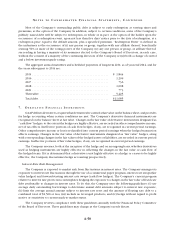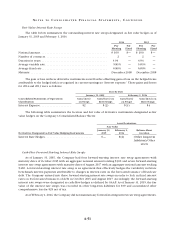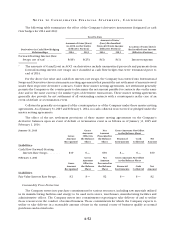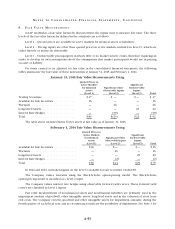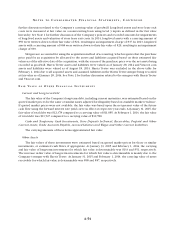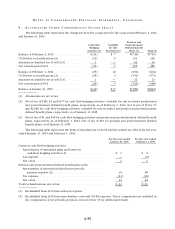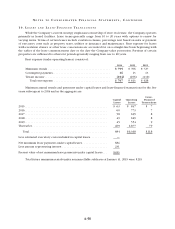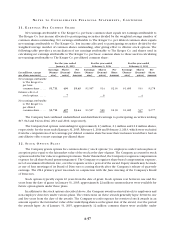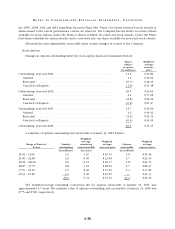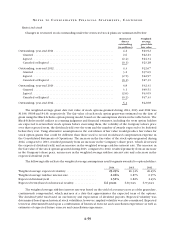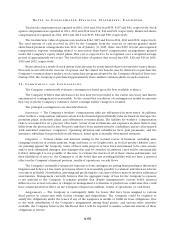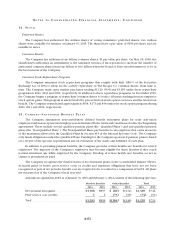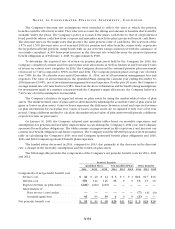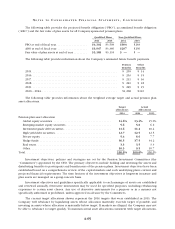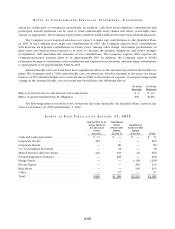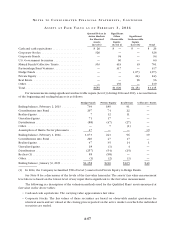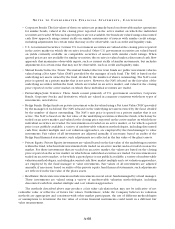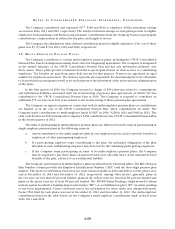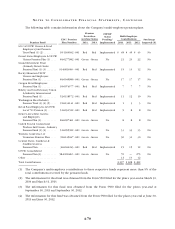Kroger 2014 Annual Report Download - page 125
Download and view the complete annual report
Please find page 125 of the 2014 Kroger annual report below. You can navigate through the pages in the report by either clicking on the pages listed below, or by using the keyword search tool below to find specific information within the annual report.A-60
NO T E S T O C O N S O L I D A T E D F I N A N C I A L S T A T E M E N T S , CO N T I N U E D
Total stock compensation recognized in 2014, 2013 and 2012 was $155, $107 and $82, respectively. Stock
option compensation recognized in 2014, 2013 and 2012 was $32, $24 and $22, respectively. Restricted shares
compensation recognized in 2014, 2013 and 2012 was $123, $83 and $60, respectively.
The total intrinsic value of options exercised was $142, $115 and $44 in 2014, 2013 and 2012, respectively.
The total amount of cash received in 2014 by the Company from the exercise of options granted under
share-based payment arrangements was $110. As of January 31, 2015, there was $205 of total unrecognized
compensation expense remaining related to non-vested share-based compensation arrangements granted
under the Company’s equity award plans. This cost is expected to be recognized over a weighted-average
period of approximately two years. The total fair value of options that vested was $26, $20 and $23 in 2014,
2013 and 2012, respectively.
Shares issued as a result of stock option exercises may be newly issued shares or reissued treasury shares.
Proceeds received from the exercise of options, and the related tax benefit, may be utilized to repurchase the
Company’s common shares under a stock repurchase program adopted by the Company’s Board of Directors.
During 2014, the Company repurchased approximately three million common shares in such a manner.
1 3 . C O M M I T M E N T S A N D C O N T I N G E N C I E S
The Company continuously evaluates contingencies based upon the best available evidence.
The Company believes that allowances for loss have been provided to the extent necessary and that its
assessment of contingencies is reasonable. To the extent that resolution of contingencies results in amounts
that vary from the Company’s estimates, future earnings will be charged or credited.
The principal contingencies are described below:
Insurance — The Company’s workers’ compensation risks are self-insured in most states. In addition,
other workers’ compensation risks and certain levels of insured general liability risks are based on retrospective
premium plans, deductible plans, and self-insured retention plans. The liability for workers’ compensation
risks is accounted for on a present value basis. Actual claim settlements and expenses incident thereto may
differ from the provisions for loss. Property risks have been underwritten by a subsidiary and are all reinsured
with unrelated insurance companies. Operating divisions and subsidiaries have paid premiums, and the
insurance subsidiary has provided loss allowances, based upon actuarially determined estimates.
Litigation — Various claims and lawsuits arising in the normal course of business, including suits
charging violations of certain antitrust, wage and hour, or civil rights laws, as well as product liability cases,
are pending against the Company. Some of these suits purport or have been determined to be class actions
and/or seek substantial damages. Any damages that may be awarded in antitrust cases will be automatically
trebled. Although it is not possible at this time to evaluate the merits of all of these claims and lawsuits, nor
their likelihood of success, the Company is of the belief that any resulting liability will not have a material
effect on the Company’s financial position, results of operations, or cash flows.
The Company continually evaluates its exposure to loss contingencies arising from pending or threatened
litigation and believes it has made provisions where it is reasonably possible to estimate and when an adverse
outcome is probable. Nonetheless, assessing and predicting the outcomes of these matters involves substantial
uncertainties. Management currently believes that the aggregate range of loss for the Company’s exposure
is not material to the Company. It remains possible that despite management’s current belief, material
differences in actual outcomes or changes in management’s evaluation or predictions could arise that could
have a material adverse effect on the Company’s financial condition, results of operations, or cash flows.
Assignments — The Company is contingently liable for leases that have been assigned to various
third parties in connection with facility closings and dispositions. The Company could be required to
satisfy the obligations under the leases if any of the assignees is unable to fulfill its lease obligations. Due
to the wide distribution of the Company’s assignments among third parties, and various other remedies
available, the Company believes the likelihood that it will be required to assume a material amount of these
obligations is remote.


